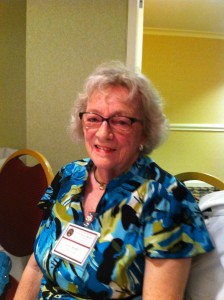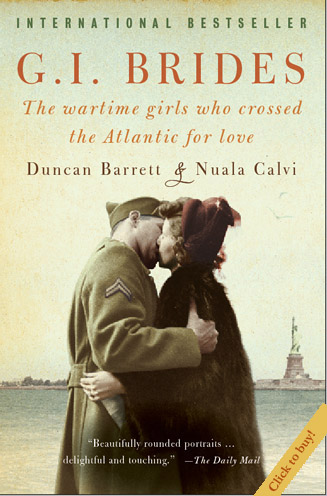‘He told me he was going to marry me the day we met’: Californian war bride Jean Borst
Posted By GI Brides ~ 6th September 2014
 Jean Borst grew up in Welwyn Garden City in Hertfordshire, England, and her schooldays were often interrupted by air raids sirens going off when German bombers offloaded their remaining bombs on the way back from blitzing London.
Jean Borst grew up in Welwyn Garden City in Hertfordshire, England, and her schooldays were often interrupted by air raids sirens going off when German bombers offloaded their remaining bombs on the way back from blitzing London.
Her father had died when she was young and her mother became the breadwinner for the family, serving as a wardrobe mistress at a nearby film studio where she worked on Alfred Hitchcock movies.
Jean was just 17 and working as a hairdresser when she met her future husband Bill Michaels through her older sister who was dating a G.I. When her sister’s date came to collect her one evening, he brought a friend with him, and Jean was allowed to tag along to make up a four.
They went to a local pub called The Cherry Tree, where the Americans impressed the local girls with his Jitterbug dancing. “Bill was a very good dancer and all the girls kept coming up and saying ‘Can we dance with him now?’” recalls Jean.
Like many G.I.s, he also had more confidence than his English counterparts.
“British boys were a lot quieter,” says Jean. “The four of us walked back home and on the way he told me he was going to marry me! When I laughed at him, he just said, ‘You’ll see.’
“Afterwards my sister asked me what I thought of her boyfriend’s friend. I said, ‘He’s crazy!’”
Bill wasn’t crazy, however, and after several more dates at The Cherry Tree and the local picture house, Jean and he were engaged.
Then, of course, he had to convince Jean’s mother.
“He spent a lot of time talking to my mother,” she says. “He figured he had to win her over.”
Another challenge was finding the material for a wedding dress, at a time when clothing was severely rationed in England. In the end, the American family had to come to the rescue. “Bill’s mother sent me some beautiful white satin for the wedding dress, and I had it made by a dressmaker’s in Welwyn Garden City,” recalls Jean. “It was a full-skirted dress with long sleeves and a high neckline.”
Bill was determined to stay in England until their first child arrived, but unfortunately he was sent home to be demobbed in July 1946 and missed the birth. Jean didn’t join him until three months later.
She flew Pan American, because Bill had heard horror stories of babies dying from dysentery on the troop ships to New York.
“I got very emotional at the airport saying goodbye,” recalls Jean, “and I still remember so well my mother trying to control her feelings.”
The couple initially went to stay with Bill’s parents in Omaha. If Jean had any worries about how her new family would feel about her, they were laid to rest as soon as they reached the house. “When we arrived his father came down the steps, gave me a big hug and said, ‘Welcome, little girl.’”
Bill’s mother, meanwhile, introduced her to the rare pleasures of clothes shopping. “I’d been through coupon rationing, and to be able to just go out and buy a new outfit was incredible.”
There were other things to get used to – not least the abundance of food and some strange new dishes to try “I had to learn to eat corn,” recalls Jean. “No one at home ever ate that. And fried chicken.”
And then there was the homesickness. “I missed my family first and foremost, and we couldn’t make a lot of phone calls in those days. I missed hearing English voices. Bill said you’ll be able to go home in two years, but in two years I was already expecting baby number two, so life got in the way. We had six children all together so I was quite busy!”
Bill stayed in the air force and the family moved around a lot. Then he decided to leave the service while he was still young enough to have another career, and he and Jean planned to settle in California. They had chosen a house in San Jose and were about to complete on it when Bill had a sudden heart attack and died.
“Bill had a sister in San Francisco, and like his parents she was a wonderful person and she was there for me,” says Jean. “The loan hadn’t gone through on the house and I had no credit to my name, so with Bill gone I wouldn’t have been able to keep the house. But she agreed to be guarantor.”
Jean knew she could have returned to England at that point, but “I never considered moving back,” she says. “My life was here. Yet to this day I still feel very English. I had tears running down my face at the Queen’s Jubilee.”
Seven years after Bill’s death, Jean found love again with George Borst, whom she met at a widow and widowers’ group of the British American Club in California. They were happily married until his death in 1982.
These days Jean is kept busy with her six grandchildren and regular meetings of her war brides group in San Jose, California, which has 80 members who are a mixture of war brides and war babies.


